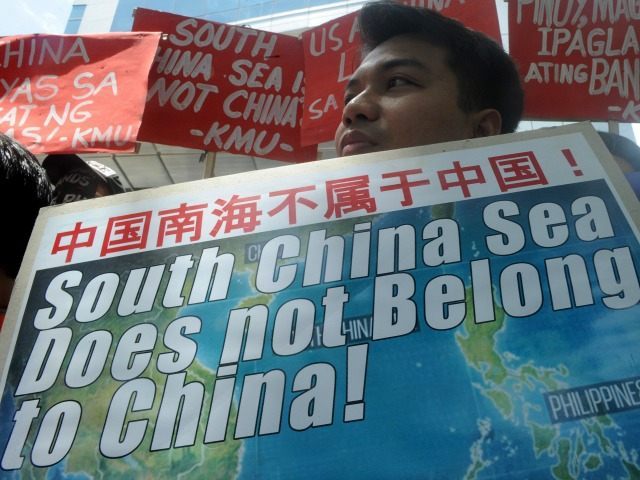As the Permanent Court of Arbitration in the Hague prepares to hear the territorial dispute among nations in the South China Sea – and the Chinese government vows to ignore any verdict – experts suggest a ruling against China could significantly hamper China’s construction of illegal artificial islands and military facilities there.
“The Chinese have pretended that it’s going to be easy to ignore and reject. I think in reality they will have to pay an international price for it,” Center for Strategic and International Studies expert Bonnie Glaser tells Reuters. Another expert, Ian Storey of the Institute of South East Asian Studies in Singapore, notes that China is “freaked” by the Hague case because it could have a long-term chilling effect on military expansion in the region, as “other countries will use it as a stick to beat Beijing with.”
The Hague accepted jurisdiction over the dispute in October, following a petition by the Philippines that China objected to. The Philippines, Vietnam, Malaysia, Brunei, and Taiwan all lay claim to some part of the body of water, while China has asserted that nearly the entire sea belongs to Beijing, as the Chinese inherited the territory “from our ancestors.” China has begun massive construction projects near the Spratly and Paracel Islands, which the Philippines and Vietnam claim jurisdiction over, respectively. In constructing artificial islands and military facilities there, Chinese ships have also attacked private Vietnamese and Filipino fishermen looking to exploit the abundant resources of the region.
In response, the Philippines has taken the case to the Hague, hoping the arbitration panel will find China in violation of the United Nations Convention on the Law of the Sea (UNCLOS). That the Hague has rejected China’s petition to remove the case has given many opposing China hope that the tribunal will find for the smaller nations protesting its monopolization of the region. China has vowed not to participate in the case and ignore its verdict entirely.
In addition to the aforementioned nations, Indonesia, which does not claim any part of the South China Sea, has expressed an interest in testifying in the case against China. “We would like to see a solution on this in the near future through dialogue, or we could bring it to the International Criminal Court [ICC],” Indonesia’s Coordinating Minister of Political, Legal, and Security Affairs Luhut Panjaitan said in November (the ICC does not take intra-nation disputes, so it is believed Panjaitan intended to name the Permanent Court of Arbitration. Both courts are located at the Hague).
Chinese state media has not made much mention of the South China Sea in recent days, though a report in the South China Morning Post indicates that further construction is ongoing in the region. The newspaper claims China has begun construction on a number of “wave farms” to generate electricity for use in running military surveillance technologies. The Chinese have also rebuked an attempt by Australian officials to mediate in the situation. According to the Sydney Morning Herald, Chinese and Australian officials had a “direct and blunt” meeting this week on the subject, in which Australian officials told Chinese military representatives they flatly refused to believe that China’s constructions in the region were strictly civilian. The Chinese representatives, on their end, warned Australia not to engage in any “freedom of navigation” exercises in the region, such as that of the USS Lassen in late October.
The news of the heated exchange between Chinese and Australian officials surfaced along with the report that Chinese hackers had attacked the Australian Bureau of Meteorology and stolen “potentially sensitive national security information” in a “massive” operation.
The Chinese government has announced a major overhaul of its military infrastructure, as well. “The reason why the military has stayed vigorous is that it has kept pace with the times and never ceased reforming itself. Now, as the country progresses from a large country to a large and powerful one, defense and military development stands at a new and historic starting line,” President Xi Jinping told military officials in a high-level meeting, according to state news outlet Xinhua.

COMMENTS
Please let us know if you're having issues with commenting.